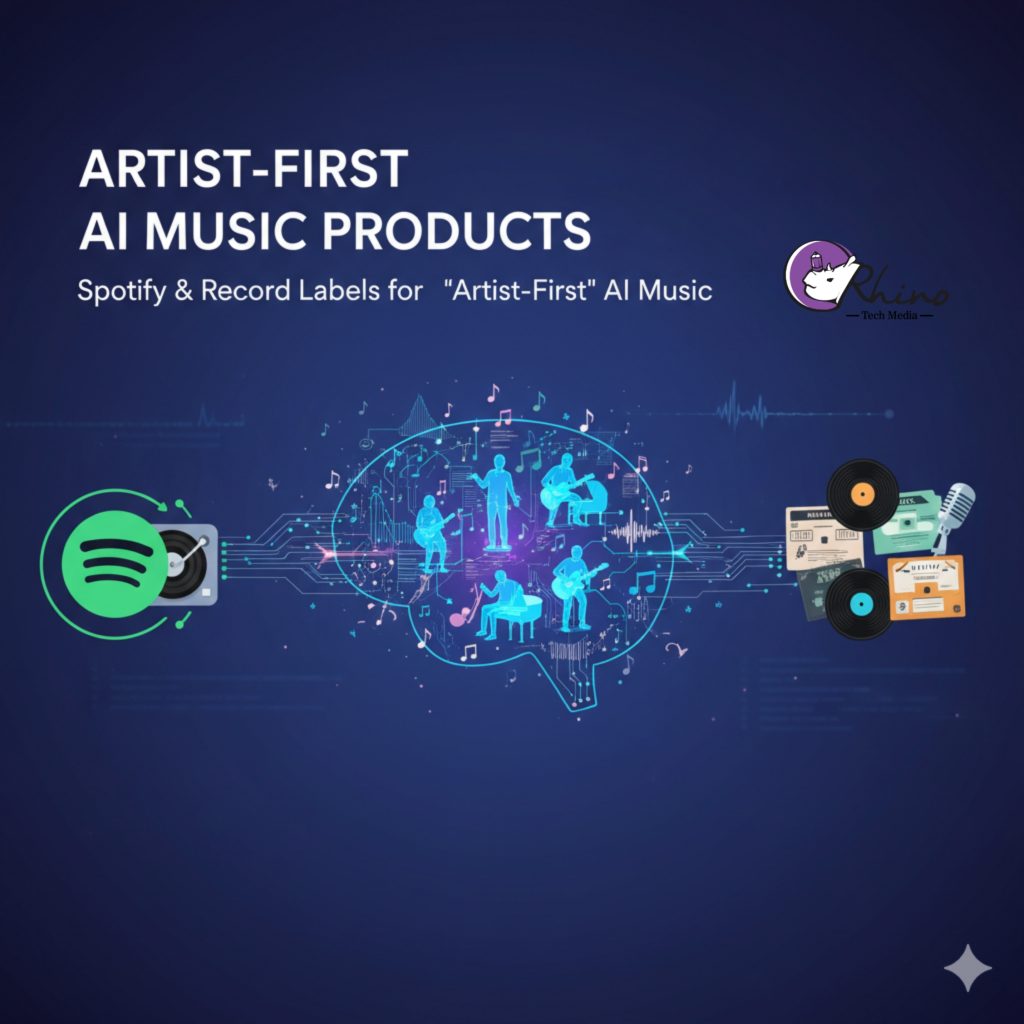Introduction — what happened
On October 16, 2025, Spotify announced a coordinated partnership with major music companies to build what it calls “artist-first” or “responsible” AI music products. The initial slate of partners named in Spotify’s announcement includes Sony Music Group, Universal Music Group, Warner Music Group, the indie rights organization Merlin, and distributor Believe; Spotify says it intends to bring additional rightsholders on board over time.
Spotify’s stated aims and the product roadmap
Spotify framed the effort as a way to develop generative-AI features that empower artists and songwriters rather than undercut or exploit them. According to the company, the programme will combine licensing agreements, crediting and compensation mechanisms, and newly built engineering resources — including a generative AI research lab and a specialist product team — so that artists can choose whether and how their work is used by AI tools. Spotify’s public messaging emphasizes consent, transparency, and direct licensing as central principles.
Why the industry is moving now — context and pressure
The announcement comes amid heightened tension between AI music startups and the major rights holders: multiple recent legal actions and growing public debate have underscored concerns about AI systems trained on copyrighted music and the ease with which models can produce imitations of artists’ voices and styles. At the same time, the streaming ecosystem has been rocked by examples of fraud and bot-driven schemes that used AI-generated tracks to siphon royalties—events that have made labels and platforms more eager to create guardrails and monetization pathways that protect creators. Spotify’s move can be read as both a defensive and opportunistic step: defensive in addressing abuses and litigation risk, opportunistic in defining the commercial architecture for AI-driven music features inside a dominant streaming service.
Potential benefits — what could go right
- Artist control and consent. By negotiating with labels and distributors before rolling out generative features, Spotify can offer artists the ability to opt in or out of model training/usage and surface explicit metadata and credits when AI models use an artist’s work. This would resolve one of the major ethical criticisms of many open-training approaches.
- Direct compensation and licensing models. If implemented fairly, licensing agreements could create new revenue lines for songwriters and performers when AI features create derivative works or personalized experiences for listeners. That would convert a perceived threat into monetizable functionality.
- Better detection and fraud prevention. Working with labels and Merlin (which already negotiates on behalf of many independents) could improve detection of bad-faith AI content and help stop bot networks that generate fraudulent plays; coordinated data sharing and labeling standards would help platform trust systems.
Risks and outstanding questions — what could go wrong
- Trust and track record. Spotify’s relationship with artists has been strained historically over questions of playlisting, payments, and alleged “fake artist” content. Skeptical artists and observers may view the initiative as too little, too late unless Spotify demonstrates concrete, enforceable safeguards and transparent accounting.
- Scope and governance. The announcement provides principles but limited technical detail. Important design questions remain: how models will be trained (what training data and with what consent), whether fingerprints/fingerprinting will identify AI-generated derivatives, how revenue splits are calculated, and who adjudicates disputes. Implementation choices will determine whether the effort is genuinely “artist-first” or primarily platform-centric.
- Independent and smaller rights-holder representation. While Merlin and Believe represent many independents, not every creator or small label has negotiating power. If the commercial deals favor major catalog holders, smaller creators may be excluded from benefits unless Spotify and partners design inclusive participation mechanics.
Industry implications — strategic and competitive effects
Spotify’s move to build in-house generative capability in partnership with major labels will likely shape the commercial norms for AI music across the streaming ecosystem. If successful, the program could become a de-facto standard (licensing framework + artist consent + compensation flows) that other platforms either adopt or must compete against. Conversely, if the initiative becomes a closed, label-centric system, it risks fragmenting the market and pushing independent innovators to alternative distribution channels. The deals also raise antitrust and competition questions in some quarters: when the dominant DSP and the major labels co-design product standards, regulators and market participants will watch closely.
What creators and listeners should watch for next
- Concrete product announcements and demos that show how artists opt in/out, how AI-derived works are labeled, and how royalties are tracked.
- Contract terms and revenue-split examples — the fine print will determine whether artists receive meaningful compensation.
- Technical transparency about model training data and detection methods; third-party audits or independent oversight would strengthen trust.
- Moves by other platforms (Apple Music, YouTube, independent distributors) to adopt similar or competing frameworks; this will affect the bargaining power of artists and labels.
Conclusion — cautious optimism, conditional on implementation
Spotify’s announcement is a significant industry development: it recognizes that generative AI in music can’t be treated as a purely technical problem and that rights, consent and compensation must be baked into product design. The partnership between a major DSP and the biggest rights organizations has the potential to create safer, monetizable AI features for creators — but the promise will only be realized through transparent technical choices, enforceable licensing terms, and inclusive participation for smaller artists. Absent those things, the initiative risks becoming another example of industry rhetoric that fails to protect the livelihoods and creative agency of individual musicians. For artists, managers, and observers, the next months of concrete product and contract detail will determine whether this is a genuine step toward “artist-first” AI or merely a rebranding of familiar platform incentives.

